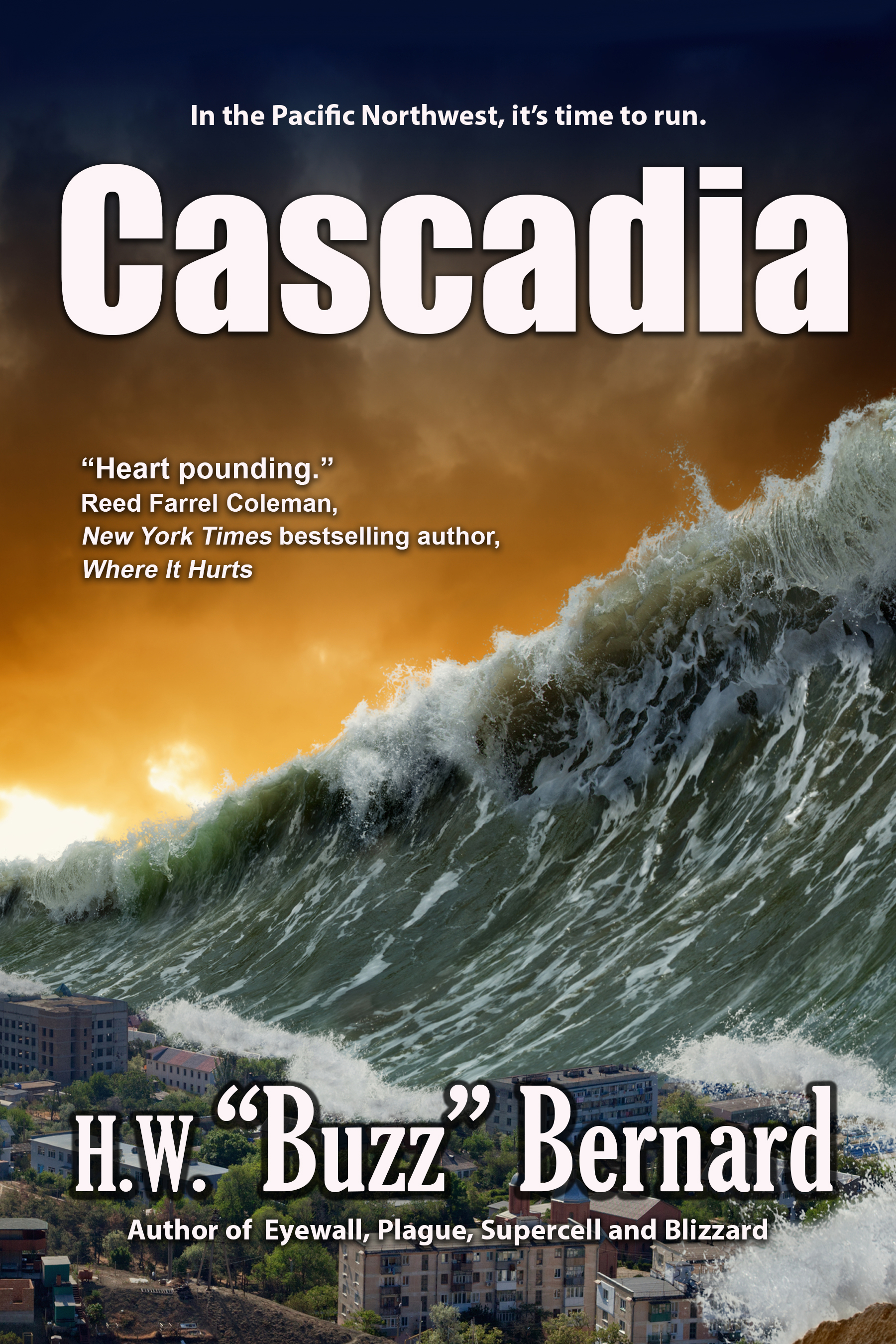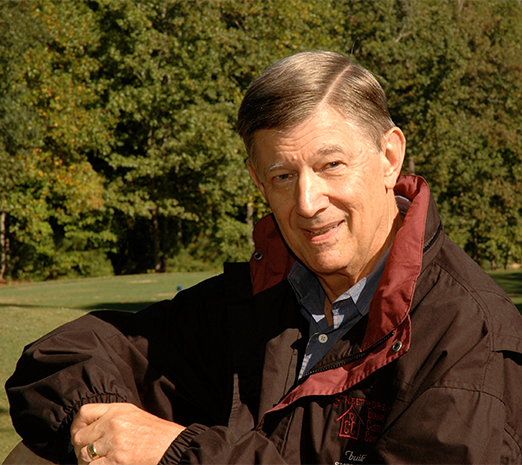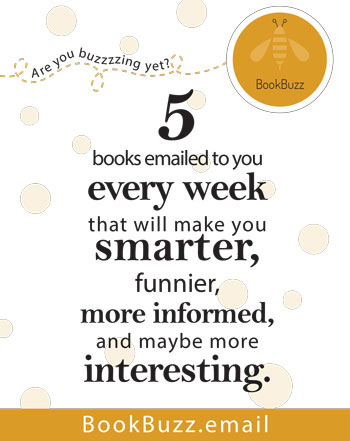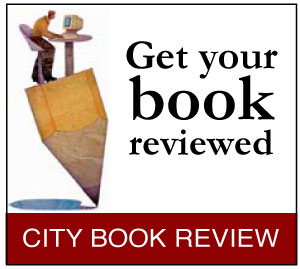Tell a little bit about yourself and how you came to writing a book.
My background is in science, specifically atmospheric science, but I’m also intrigued by geosciences in general, which is what led me to write about earthquakes and tsunamis in my newest novel, Cascadia. In college, I also took courses in creative writing and am currently president of the Southeastern Writers Association.
What was this book about and where did your decision to write it come from?
Cascadia, which has been categorized as a technothriller, is set against a megaquake and tsunami that will–not may–strike the Pacific Northwest. Here’s the logline: Confronted by a massive earthquake and tsunami in the PacNW, a respected geologist must make two gut-wrenching decisions. One could cost him his reputation. The other, his life.
The decision to write it sprang from the the fact that when I grew up in the Northwest, fifty years ago, there was no concern about a major earthquake disaster. It’s been only in the past thirty years that scientists have come to realize the region is now ground zero for “The Big One,” thanks to something called the Cascadia Subduction Zone.
How long did it take you to write the book?
From my initial, handwritten notes to publication, two years. The actual writing (putting words on paper) took about a year.
Did you have a publisher or agent? If not, was it by choice?
I had both an agent and a publisher.
Did you use anyone to help with the finished design? Editors, cover designers, etc.?
The design issues were largely handled by my publisher, although I had input on the cover design.
When did you start preparing to market your book? What kind of research did you do?
I knew from being involved with the marketing of four previous novels what worked (not much) and what didn’t (a lot of stuff).
What is the difference between your book and other books on the subject?
I don’t know, because I’ve not read any other novels on the same subject. (I read nonfiction only as part of my research). I do know I stuck very close to facts and did not venture into science fiction or speculative fiction. Also, I tried to focus as much on the characters in Cascadia as I did the earthquake and tsunami. It’s characters that drive a novel.
Did you use an outside publicity or marketing firm? If so, what benefits did they provide you?
I used an outside publicity firm, Mindbuck Media. The reason is that my publisher provided an absolute minimum of prepublication publicity (meaning virtually none) for my previous novel, Blizzard, and sales were abysmal. I didn’t want to go through that again . . . I needed to try something different with Cascadia.
Also, because the novel is set in the PacNW, and I live in Georgia, I wanted a publicity firm with connections in the Northwest. Mindbuck turned out to be a perfect fit.
Did you use any paid ads or posts? Did you use social media, guest posts, interviews or other personal marketing?
The only thing I paid for was a featured promo (for three consecutive days) in the “Kindle Book Review” about nine months after Cascadia’s release. It didn’t move the sales needle significantly. For other books, I’ve tried blog tours, Goodread’s giveaways, Facebook ads, a series of focused Facebook posts, special presentations, and panel appearances. None proved effective, in terms of increasing sales.
Where did you get your first reviews for the book? What places did you go to get reviews?
The first reviews of Cascadia, some from reviewers of my previous novels, appeared on the Web. Mindbuck Media handled getting the reviews (see answer to next question).
What marketing event or plan was your most successful? How did you come up with the idea and how did you execute it?
Hiring a publicist turned out to be the most effective thing I’ve done. The gross royalties from Cascadia during its first six months on the market covered the expense of hiring Mindbuck . . . and a little bit more. The real coup, in terms of publicity, turned out to be a three-quarter page spread in The Sunday Oregonian, the Northwest’s flagship newspaper. In the graphic below, you can see two significant sales ranking upticks, first on July 11 (the release date plus the time the majority of reviews were published) and the second on September 11 (when the spread in The Oregonian was published). Notice also that sales rankings didn’t merely peak, then nosedive, they maintained themselves.
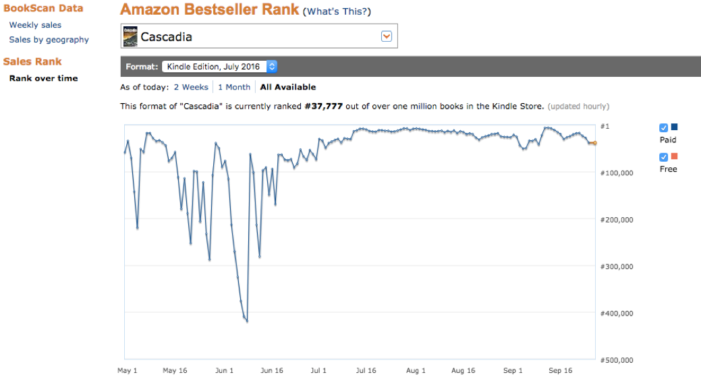
What are your book sales like?
Cascadia, with Mindbuck’s help, sold more units (~2,080) in its first six months on the market than Blizzard did in two years. Remember, Blizzard had virtually no promotion. (Both novels are rated very similarly, a little over 4.0, on Goodreads.) Also, Cascadia reached 50 reviews on Amazon twice as fast as did Blizzard.
What books influenced your writing and your book marketing?
Writing: novels by James Lee Burke. Marketing: no books, only my past experience.
What tools do you use for marketing or writing?
No special tools.
What tips or suggestions would you give to someone else getting ready to publish or market a book?
Learn the craft of writing. For marketing, listen to those who have been on the battlefield.
Final note:
The most effective marketing technique I’ve seen over the past six years was a giveaway for my debut novel, Eyewall, on Amazon’s Kindle. After the giveaway, the novel hit #1 in sales on Kindle. That was in 2011, kind of a Cinderella time for eBooks and Amazon. The giveaway was set up by my publisher. They say giveaways no longer work: there’s too much crap on the market now and it’s diluted the effectiveness of such approaches.
